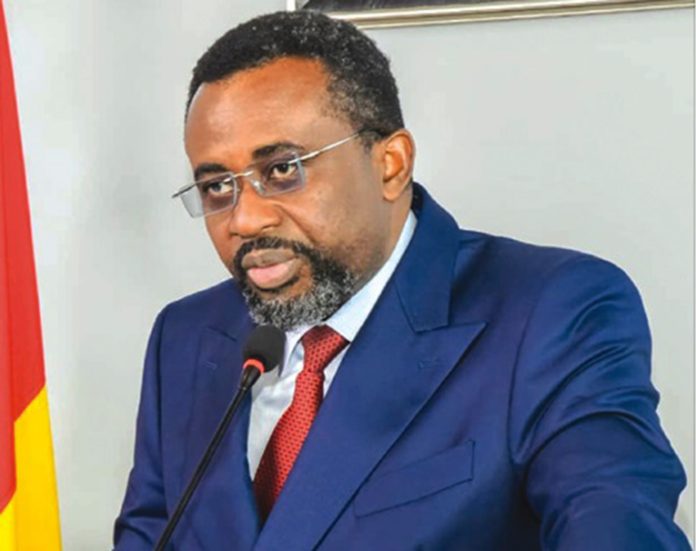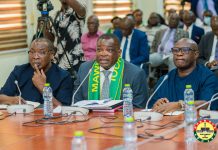The Bank of Ghana (BoG) has slashed its benchmark Monetary Policy Rate by 350 basis points to 21.5%, citing sustained disinflation, easing inflation expectations, and a stronger external sector.
The decision, announced after the September 2025 Monetary Policy Committee (MPC) meetings, represents one of the sharpest cuts in recent years and is expected to ease borrowing costs and stimulate private sector activity.
The Governor of BoG, Dr. Johnson Asiama, said the decision reflected the Bank’s confidence that inflation will continue its downward path in the months ahead.
Inflation fell to 11.5% in August 2025, the lowest in four years and down from 12.1% in July, marking the eighth consecutive month of decline.
“The Committee is confident that inflation will continue to ease in the near term and fall within the medium-term target band of 8% by the end of the fourth quarter,” the Governor stated.
He, however, warned that possible upward reviews of utility tariffs could exert some price pressures in the medium term.
Lending Rates and Market Impact
The cut has already started to ease money market rates. Yields on the 91-day Treasury bill dropped to 10.3% in August from 13.4% in July, while average lending rates fell from 26.6% to 24.2%.
Analysts expect further declines in the cost of credit, which could provide a boost for businesses and households.
“Interest rates are declining, and the lower cost of credit should stimulate private sector activity and support further growth,” the Governor noted.
Growth Momentum
The latest data from the Ghana Statistical Service confirmed that real GDP grew by 6.3% in the second quarter of 2025 compared with 5.7% in the same period last year. Non-oil GDP growth was even stronger at 7.8%, driven by a 9.9% expansion in services and 5.2% growth in agriculture.
BoG’s high-frequency indicators also suggest sustained economic momentum. The Composite Index of Economic Activity recorded 6.1% growth in July, compared to 1.9% a year earlier. Business confidence rose in August as firms met short-term targets, while the Consumer Confidence Index remained resilient.
Fiscal and Debt Consolidation
Fiscal policy also showed encouraging signs. The overall fiscal deficit stood at 1.1% of GDP by July 2025, better than the target of 2.1%. The primary balance recorded a surplus of 1.0% of GDP, compared to a target of 0.5%.
Public debt declined sharply to 44.9% of GDP at the end of July, from 61.8% at the end of 2024, reflecting ongoing consolidation efforts.
The external sector strengthened significantly, recording a trade surplus of US$6.2 billion in the first eight months of 2025, up from US$2.1 billion a year earlier. This was driven mainly by higher gold and cocoa export earnings.
International reserves stood at US$10.7 billion, equivalent to 4.5 months of import cover, compared with US$8.98 billion at the end of 2024. The cedi has gained 21% against the US dollar year-to-date, making it one of the strongest performing currencies globally.
“This reflects prudent monetary policy, effective liquidity management, fiscal consolidation, and increased foreign exchange inflows,” Dr. Asiama emphasised.
The banking industry also showed improved capitalization and asset quality. The capital adequacy ratio rose to 17.7% in August from 10.2% a year earlier, while non-performing loans fell to 20.8% from 24.8%.
Dr. Addison, however, cautioned that credit risks remain elevated and urged banks to strictly adhere to recapitalization plans and regulatory guidelines.
Markets, Reserves, and Policy Outlook
During a Q&A session, the Governor addressed concerns over reserves, foreign exchange, and market confidence.
On why the market had not responded strongly to Ghana’s improved economic data, Dr.Asiama said the fundamentals were solid and short-term dips in reserves should not be misinterpreted.
“The drop you are talking about is what I call a blip in the last two to three months. Remember, we made a number of lumpy payments, including to IPPs and bondholders. But the overall trend is upward. Don’t just look at the last three months, look at the trajectory over the past seven years,” he explained.
On remittance inflows, the Governor confirmed that banks had observed a decline, but assured that measures taken by the central bank were already yielding results.
“We are beginning to see some of the International Money Transfer Operations rerouting flows back into the country. Our desire is to see greater levels of interbank market trading,” he said.
He also dismissed fears about shortages of foreign exchange.
“As of yesterday, every import demand submitted by the banks was met. We have enough reserves to cover all projected imports, including Christmas season needs. So there should be no anxiety about the exchange rate going forward,” he stressed.
The Governor further revealed progress on new financial sector frameworks. The Virtual Assets Bill is ready and with the Attorney General’s Department, with parliamentary discussions scheduled in the coming weeks.
BoG is also advancing work on a gold hedging programme as a risk management tool to shield reserves from price volatility.
On the stability of the cedi, he emphasized that the MPC took the currency into account when cutting rates.
“Strong sterilisation efforts have been deployed to offset liquidity effects from rate cuts. With the cocoa season beginning and gold exports picking up, stability of the cedi should not be an issue,” he assured.
Regarding regulatory forbearance for banks, Dr. Asiama said the December 2025 deadline remains.
“When we get there, we’ll reassess the framework. But our objective to ensure financial stability remains unchanged,” he said, adding “the Committee will continue to monitor developments and take appropriate policy decisions to reinforce the disinflation process.”









